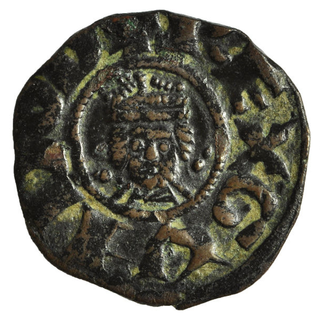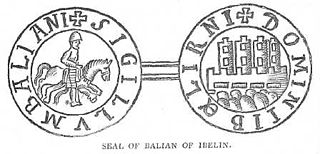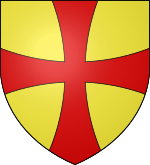
Guy of Lusignan was a French Poitevin knight who reigned as the king of Jerusalem from 1186 to 1192 by right of marriage to Sibylla, and King of Cyprus from 1192 to 1194.
Hugh III, also called Hugh of Antioch-Lusignan and the Great, was the king of Cyprus from 1267 and king of Jerusalem from 1268. Born into the family of the princes of Antioch, he effectively ruled as regent for underage kings Hugh II of Cyprus and Conrad III of Jerusalem for several years. Prevailing over the claims of his cousin Hugh of Brienne, he succeeded both young monarchs upon their deaths and appeared poised to be an effective political and military leader.

Henry I of Cyprus, nicknamed the Fat was King of Cyprus from 1218 to 1253. He was the son of Hugh I of Cyprus and Alice of Champagne. When his father Hugh I died on January 10, 1218, the 8-month-old Henry became king. His mother was the official regent, but delegated governing to her uncle, Philip of Ibelin. When Philip died, the effective regency passed to his brother, John of Ibelin, the Old Lord of Beirut.

The Kingdom of Jerusalem, one of the Crusader states that was created in 1099, was divided into a number of smaller seigneuries. According to the 13th-century jurist John of Ibelin, the four highest crown vassals in the kingdom proper were the count of Jaffa and Ascalon, the prince of Galilee, the lord of Sidon, and the lord of Oultrejordain.

The House of Ibelin was a noble family in the Crusader Kingdom of Jerusalem in the 12th century. They rose from humble beginnings to become one of the most important families in the kingdom, holding various high offices and with extensive holdings in the Holy Land and Cyprus. The family disappeared after the fall of the Kingdom of Cyprus in the 15th century.

Barisan of Ibelin was an important figure in the crusader Kingdom of Jerusalem, and was the founder of the Ibelin family. His name was later written as "Balian" and he is sometimes known as Balian the Elder, Barisan the Old or Balian I. Barisan was lord of Ramla from 1138 to 1150.
Hugh of Ibelin was an important noble in the Kingdom of Jerusalem and was Lord of Ramla from 1152-1169.
Baldwin of Ibelin, also known as Baldwin II of Ramla, was an important noble of the Kingdom of Jerusalem in the 12th century and was lord of Ramla from 1169-1186. He was the second son of Barisan of Ibelin, and was the younger brother of Hugh of Ibelin and older brother of Balian of Ibelin. He first appears in the historical record as a witness to charters in 1148.

Balian of Ibelin, also known as Barisan the Younger, was an Italian crusader noble of the Kingdom of Jerusalem in the 12th century. He was lord of Ibelin from 1170 to 1193. As the leader of the defense of the city during the siege of Jerusalem in 1187, he surrendered Jerusalem to Saladin on 2 October 1187.
John of Ibelin, called the Old Lord of Beirut, was a powerful crusader noble in the 13th century, one of the best known representatives of the influential Ibelin family. The son of Balian of Ibelin and the dowager queen Maria Comnena, he had close ties with the nobility of both Cyprus and Jerusalem, since he was the half-brother of Queen Isabella I of Jerusalem. Before he was 20, he was appointed constable of Jerusalem, and a few years later became Lord of Beirut. John rebuilt Beirut after Saladin's conquest, and established the grand Ibelin family palace. He served as regent of Jerusalem on behalf of his niece Maria of Montferrat from 1205 to 1210 after her mother, Queen Isabella, died. He was also regent for Isabella's grandson Henry I of Cyprus from 1228 until Henry came of age in 1232. John was known as a principled man, and was seen as the natural leader of the Christian barons in the Holy Land. He resisted the power-seeking of Frederick II, Holy Roman Emperor, in Cyprus, and opposed the imperial forces until King Henry came of age.
John of Ibelin, count of Jaffa and Ascalon, was a noted jurist and the author of the longest legal treatise from the Kingdom of Jerusalem. He was the son of Philip of Ibelin, bailli of the Kingdom of Cyprus, and Alice of Montbéliard, and was the nephew of John of Ibelin, the "Old Lord of Beirut". To distinguish him from his uncle and other members of the Ibelin family named John, he is sometimes called John of Jaffa.

The principality of Galilee was one of the four major seigneuries of the crusader Kingdom of Jerusalem, according to 13th-century commentator John of Ibelin, grandson of Balian. The direct holdings of the principality centred around Tiberias, in Galilee proper, but with all its vassals, the lordship covered all Galilee and southern Phoenicia. The independent Lordship of Sidon was located between Galilee's holdings. The principality also had its own vassals: the Lordships of Beirut, Nazareth, and Haifa.
Amalric, Lord of Tyre, also called Amalric of Lusignan or Amaury de Lusignan was a prince and statesman of the House of Lusignan, a younger son of King Hugh III of Cyprus and Isabella of the House of Ibelin. He was given the title of Lord of Tyre in 1291, shortly before the city of Tyre fell to the Mamluks of Egypt. He is often but incorrectly called the Prince of Tyre.

The Embriaco family were a prominent Genoese family, who played an important role in the history of the Crusader states. It also gave consuls, admirals and ambassadors to the Republic of Genoa.

Balian III of Beirut was the Lord of Beirut, the second of his family, from 1236, and a son of the famous "Old Lord" John of Ibelin, by his second wife Melisende of Arsuf. From his father he assumed the leadership of the nobility in the War of the Lombards, fought against the agents of the Emperor Frederick II.
Guy of Ibelin, of the Ibelin family, was count of Jaffa and Ascalon during the latter part of the Crusades. He was the son of John of Ibelin and Maria of Barbaron. He was count in name only. His father, John of Jaffa, had died in 1266, after which the fragile truce with the Muslims collapsed, and Jaffa was captured by Baibars in 1268. John was probably succeeded by Guy's older brother James, who held the title of Count of Jaffa until his death in 1276, at which point the title passed to Guy.
Isabella of Ibelin (1241–1324) was queen of Cyprus and Jerusalem by marriage to Hugh III of Cyprus.

Melisende was the hereditary Lady of Arsuf from 1177 and the second wife of the powerful nobleman John, Old Lord of Beirut.
Alix of Ibelin, was Queen consort of Cyprus and nominal Queen consort of Jerusalem as the second wife of King Hugh IV of Cyprus. She was queen from 31 March 1324 until Hugh's abdication on 24 November 1358. Two of her sons, Peter and James reigned as kings of Cyprus.

Philip of Ibelin was Seneschal of the Kingdom of Cyprus. As one of the sons of Philippa Barlais and her husband Guy of Ibelin, he was a member of the house of Ibelin.








